
Journal of Sedimentary Environments
Scope & Guideline
Connecting Researchers to Shape the Future of Sedimentary Studies.
Introduction
Aims and Scopes
- Sedimentology and Stratigraphy:
The journal primarily addresses the processes of sediment deposition, transport, and diagenesis, including the analysis of sedimentary structures and facies. This includes both clastic and carbonate systems. - Paleoenvironmental and Paleoclimatic Studies:
Research often emphasizes the reconstruction of past environments and climates based on sedimentary records, including the use of geochemical proxies and fossil assemblages to interpret historical ecological conditions. - Petroleum Geology and Hydrocarbon Potential:
A significant focus is placed on the exploration and evaluation of sedimentary basins for hydrocarbon resources, including studies on source rocks, reservoirs, and the geochemical characterization of sediments. - Geochemistry and Mineralogy:
The journal also covers the geochemical analysis of sediments and rocks, including the investigation of mineralogical composition and its implications for provenance, weathering processes, and environmental change. - Soil Erosion and Conservation:
Another aspect is the study of soil erosion dynamics, conservation strategies, and the impacts of land use changes on sediment yield, with applications in environmental management and sustainability.
Trending and Emerging
- Integrated Geophysical and Geochemical Approaches:
There is a growing trend towards integrating geophysical methods with geochemical analyses to better understand subsurface characteristics, hydrocarbon potential, and sediment dynamics. - Impact of Climate Change on Sedimentary Processes:
Research increasingly focuses on how climate change affects sediment transport, erosion, and deposition, reflecting the urgency of understanding these impacts in the context of global environmental change. - Advanced Remote Sensing Techniques:
The application of remote sensing technologies, such as satellite imaging and GIS, for sediment analysis and environmental monitoring is becoming more prevalent, providing new insights into sedimentary processes over large spatial scales. - Microplastics and Environmental Contaminants:
There is an emerging focus on the study of microplastics and other contaminants within sedimentary environments, highlighting the importance of understanding anthropogenic impacts on sediment quality and ecosystem health. - Interdisciplinary Approaches to Sediment Management:
Research increasingly emphasizes interdisciplinary methodologies that combine sedimentology with ecological, hydrological, and socio-economic perspectives to address complex environmental challenges.
Declining or Waning
- Traditional Biostratigraphy:
While biostratigraphy remains an important tool, there has been a noticeable decline in studies focused solely on traditional biostratigraphic methods without integrating modern geochemical or molecular techniques. - Classic Sediment Transport Models:
Research employing older sediment transport models without adaptations to contemporary findings and technologies has become less frequent, as there is a growing preference for more integrated, multi-faceted approaches. - Static Paleoenvironmental Reconstructions:
Studies that provide static or singular reconstructions of past environments without considering dynamic changes and feedbacks over time have been decreasing, as newer methodologies emphasize the complexity and variability of sedimentary systems.
Similar Journals
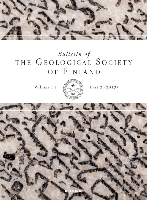
BULLETIN OF THE GEOLOGICAL SOCIETY OF FINLAND
Bridging disciplines to deepen our understanding of geology.BULLETIN OF THE GEOLOGICAL SOCIETY OF FINLAND, a distinguished publication in the field of Geology, has been at the forefront of scientific discourse since its inception. Published by the Geological Society of Finland, this journal offers an Open Access platform for researchers since 1968, ensuring that high-quality geological research is widely accessible. With an ISSN of 0367-5211 and E-ISSN 1799-4632, the journal aims to disseminate significant findings in Earth and planetary sciences, contributing to a richer understanding of geological phenomena. Situated in Finland and headquartered at the Finnish Museum of Natural History, University of Helsinki, it serves as a pivotal resource for professionals, students, and researchers, maintaining a respectable Q3 category rank in Geology as of 2023 within Scopus' metrics. The journal is committed to fostering the advancement of geology through rigorous peer-reviewed articles, innovative research methodologies, and interdisciplinary approaches, helping to bridge gaps in knowledge while inspiring new generations of geoscientists.
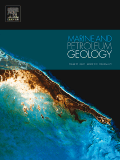
MARINE AND PETROLEUM GEOLOGY
Innovating Insights for a Sustainable FutureMarine and Petroleum Geology, published by Elsevier Science Ltd, is a premier, multidisciplinary journal that addresses critical advancements in the fields of geology, geophysics, oceanography, stratigraphy, and economic geology. With an impressive 2023 impact factor reflecting its influence across these vital domains, this journal maintains a prestigious standing, having achieved a Q1 ranking in multiple categories, including Economic Geology and Geophysics. Since its inception in 1984, it has been a key platform for researchers and practitioners to disseminate innovative findings, foster interdisciplinary dialogue, and enhance our understanding of geological processes affecting marine and petroleum resources. The journal is particularly valuable for those looking to stay abreast of the latest developments in Earth sciences, contributing to both academic knowledge and practical applications. Available through traditional subscription access, it serves as a cornerstone resource for scientists, students, and professionals eager to engage with cutting-edge research.
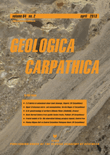
GEOLOGICA CARPATHICA
Illuminating Geological Insights for a Global AudienceGEOLOGICA CARPATHICA, with ISSN 1335-0552 and E-ISSN 1336-8052, is a distinguished open access journal published by the Slovak Academy of Sciences Geological Institute, serving as a pivotal platform for the dissemination of research in the field of Geology. Established in 1991 and continuing through 2024, the journal is recognized for its significant contributions to Earth and Planetary Sciences, evidenced by its 2023 Scopus ranking placing it in the second quartile (Q2) within Geology. With an H-index that showcases its impactful publications, GEOLOGICA CARPATHICA is committed to fostering scholarly communication while promoting accessible research, having adopted an open access model since 2009. Located in beautiful Bratislava, Slovakia, this journal aims to engage a global audience of researchers, professionals, and students interested in ecological, geological, and environmental studies, making it a prominent resource for enriching the scientific community's understanding of the Carpathian region and beyond.
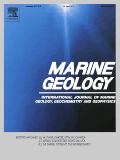
MARINE GEOLOGY
Connecting Geology and Oceanography for a Sustainable Future.MARINE GEOLOGY, published by Elsevier, is a premier journal dedicated to advancing the understanding of marine geological processes and their interactions with the Earth's systems. With an ISSN of 0025-3227 and an E-ISSN of 1872-6151, this esteemed journal has been a vital resource for researchers and professionals since its inception in 1964. The journal is recognized for its high impact, with commendable rankings, including Q1 in both Geology and Oceanography, and Q2 in Geochemistry and Petrology according to its 2023 category quartiles. With a Scopus rank within the top percentiles in various fields, MARINE GEOLOGY offers a platform for original research, critical reviews, and significant advancements in the field, covering topics ranging from sedimentology to geochemical processes in marine environments. Although it does not operate under an open-access model, its rigorous peer-review process ensures high-quality publications that contribute to our understanding of oceanic and geological sciences. Researchers, students, and professionals alike will find MARINE GEOLOGY to be an essential resource for collaboration and discovery within the vast field of marine science.
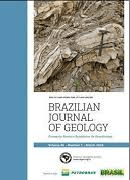
Brazilian Journal of Geology
Bridging Geoscience and InnovationBrazilian Journal of Geology, the flagship publication of the SOC BRASILEIRA GEOLOGIA, has been a beacon of geoscientific research since its inception in 2013. With an ISSN of 2317-4889 and an E-ISSN of 2317-4692, this open-access journal has facilitated the dissemination of high-quality research across various branches of geosciences, making it freely accessible to a global audience since 2014. Hailing from Brazil, the journal proudly holds a Q2 ranking in Earth and Planetary Sciences as of 2023, and ranks #73 out of 195 in Scopus, indicating its growing impact and relevance in the field. The Brazilian Journal of Geology aims to bridge diverse geological studies with interdisciplinary approaches, promoting the understanding and application of geology in addressing contemporary scientific challenges. As it converges research from 2013 to 2024, the journal not only enriches the academic landscape but also serves as a vital resource for researchers, professionals, and students eager to explore the complexities of the Earth and its processes.
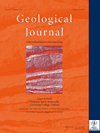
GEOLOGICAL JOURNAL
Advancing geological knowledge through peer-reviewed excellence.GEOLOGICAL JOURNAL, an esteemed publication by WILEY, has been at the forefront of geological research since its inception in 1951. With an ISSN of 0072-1050 and E-ISSN of 1099-1034, this journal serves as a vital platform for disseminating high-quality, peer-reviewed research in the field of geology. Operating out of the United Kingdom, the journal proudly features a Scopus rank of 80 out of 321 in the Earth and Planetary Sciences category, reflecting its commitment to scholarly excellence, with a 2023 category quartile ranking of Q2. As part of its innovative approach, GEOLOGICAL JOURNAL seeks to foster interdisciplinary collaborations, advancing our understanding of earth processes, materials, and history. Although it does not offer open access options, its robust subscription model ensures that both professionals and students have access to groundbreaking insights. With a publication history that spans over seven decades, the GEOLOGICAL JOURNAL continues to be an indispensable resource for the global geological community, encouraging discoveries that shape our comprehension of the planet.

JOURNAL OF IBERIAN GEOLOGY
Unveiling the intricate layers of Iberian geological phenomena.JOURNAL OF IBERIAN GEOLOGY, published by Springer International Publishing AG, is a pivotal platform dedicated to advancing the field of geology and stratigraphy. With an ISSN of 1698-6180 and E-ISSN of 1886-7995, this journal has earned its reputation in the academic community, holding a commendable Q2 ranking in both Geology and Stratigraphy for 2023, reflecting its contributions to contemporary geological research. Spanning from 2007 to 2024, it provides a comprehensive forum for scholars and practitioners from around the globe to disseminate their findings pertaining to the Iberian Peninsula, enhancing the understanding of regional geological phenomena. The journal has carved out a significant niche within the Earth and Planetary Sciences, ranking #137 out of 321 in Geology and #24 out of 55 in Stratigraphy, indicating its wide-reaching impact and scholarly engagement. The Journal of Iberian Geology serves as an indispensable resource for those interested in the complexities of geological structures, stratigraphic sequences, and the broader implications of geological research, making it a vital reference for researchers, professionals, and students alike.

Gondwana Research
Fostering Global Collaboration in Earth SciencesGondwana Research is a premier academic journal published by Elsevier, specializing in the field of geology, with a robust focus on the geological history and processes of the Gondwana supercontinent. With an impressive impact factor and ranking as Q1 in the 2023 Geology category, it stands as a leading platform for disseminating high-quality research. The journal features articles that advance the understanding of Earth and planetary sciences, making significant contributions to geological education and research. Researchers will find its curated content particularly valuable, as it encompasses a wide array of topics including stratigraphy, paleontology, and tectonics, all relevant to both contemporary and historical geological inquiries. Given its substantial reach and esteemed standing—ranked 5th out of 321 in its field—Gondwana Research plays a crucial role in fostering scientific exchange among global experts. Located in the United States with publication continuity from 1997 to 2024, this journal consistently attracts submissions from leading scientists, ensuring that its readership is kept at the forefront of geological discovery and innovation.
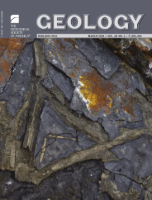
GEOLOGY
Exploring the Depths of Geological KnowledgeGEOLOGY, published by the Geological Society of America, Inc, is a premier journal dedicated to advancing knowledge, research, and discussion in the field of geology. With an ISSN of 0091-7613 and an E-ISSN of 1943-2682, this journal stands out with an impressive Q1 ranking in Geology for 2023, positioning it among the top journals in the realm of Earth and Planetary Sciences, specifically holding a remarkable rank of 11 out of 321, reflecting its 96th percentile status. This journal aims to publish innovative research articles that cover all aspects of geology, from tectonics and sedimentology to paleontology and mineralogy, offering invaluable insights for researchers, professionals, and students alike. Although not currently open access, GEOLOGY maintains a rigorous review process ensuring the quality and integrity of the research it publishes. For more than five decades, spanning from its inception in 1973 to the upcoming publications in 2024, GEOLOGY has been instrumental in shaping the geological discourse and continues to be a vital resource for the scientific community.
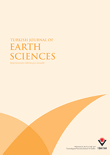
TURKISH JOURNAL OF EARTH SCIENCES
Unveiling the Secrets of Our PlanetTURKISH JOURNAL OF EARTH SCIENCES, published by the Tubitak Scientific & Technological Research Council Turkey, is a premier platform dedicated to advancing the field of Earth and Planetary Sciences. With an ISSN of 1300-0985, this journal has been a significant contributor to the international scientific community since its inception in 2002, and is set to continue publishing groundbreaking research through 2024. As a recognized journal in the Q2 quartile of Earth and Planetary Sciences, it ranks #98 out of 195 in its category according to Scopus metrics, positioning it within the 50th percentile of its field. The journal emphasizes peer-reviewed research, providing invaluable insights that facilitate scholarly discourse and promote rigorous investigation into various aspects of the Earth sciences. Although it does not currently offer open access, the journal remains a vital resource for academics, professionals, and students seeking to deepen their understanding of geological phenomena and contribute to the advancement of this essential discipline.